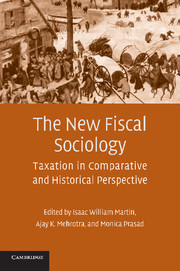Book contents
- Frontmatter
- Contents
- List of Contributors
- Acknowledgments
- Foreword
- 1 The Thunder of History: The Origins and Development of the New Fiscal Sociology
- PART ONE SOCIAL SOURCES OF TAXATION: AMERICAN TAX POLICY IN COMPARATIVE PERSPECTIVE
- PART TWO TAXPAYER CONSENT
- PART THREE THE SOCIAL CONSEQUENCES OF TAXATION
- 10 Extraction and Democracy
- 11 Improving Tax Administration in Contemporary African States: Lessons from History
- 12 Adam Smith and the Search for an Ideal Tax System
- 13 Where's the Sex in Fiscal Sociology?: Taxation and Gender in Comparative Perspective
- 14 The Shoup Mission to Japan: Two Political Economies Intersect
- Epilogue: A Renaissance for Fiscal Sociology?
- References
- Index
14 - The Shoup Mission to Japan: Two Political Economies Intersect
Published online by Cambridge University Press: 13 January 2010
- Frontmatter
- Contents
- List of Contributors
- Acknowledgments
- Foreword
- 1 The Thunder of History: The Origins and Development of the New Fiscal Sociology
- PART ONE SOCIAL SOURCES OF TAXATION: AMERICAN TAX POLICY IN COMPARATIVE PERSPECTIVE
- PART TWO TAXPAYER CONSENT
- PART THREE THE SOCIAL CONSEQUENCES OF TAXATION
- 10 Extraction and Democracy
- 11 Improving Tax Administration in Contemporary African States: Lessons from History
- 12 Adam Smith and the Search for an Ideal Tax System
- 13 Where's the Sex in Fiscal Sociology?: Taxation and Gender in Comparative Perspective
- 14 The Shoup Mission to Japan: Two Political Economies Intersect
- Epilogue: A Renaissance for Fiscal Sociology?
- References
- Index
Summary
INTRODUCTION: AN AMBITIOUS MISSION
Between 1945 and 1952, during the military occupation of Japan, the administration of President Harry S. Truman undertook a restructuring of Japan's tax system. The most visible aspect of this effort was the so-called Shoup mission to Japan. On May 10, 1949, General Douglas MacArthur, the Supreme Commander for the Allied Powers (SCAP), brought to Japan a group of American tax experts, under the leadership of Carl S. Shoup, a distinguished professor of economics and public finance at Columbia University. SCAP charged the Shoup mission with the task of studying the Japanese tax system and making recommendations for its comprehensive reform. Three months later, the Shoup mission filed an extensive report that surveyed the Japanese tax system and made numerous recommendations (Shoup Mission 1949a, b). The mission was the most ambitious project ever of American experts to transform a national tax system, either at home or abroad. For both the Truman administration and the Japanese government, the stakes of the mission's work were high. Both assumed that comprehensive tax reform in Japan, just as in the United States, could influence economic stability, shape the course of economic development, reconfigure democratic institutions and practices, and advance the strategic, international interests of liberal democracies. Consequently, the background, recommendations, and effects of the mission provide a window into the political economies of both the United States and Japan.
- Type
- Chapter
- Information
- The New Fiscal SociologyTaxation in Comparative and Historical Perspective, pp. 237 - 255Publisher: Cambridge University PressPrint publication year: 2009
- 2
- Cited by



